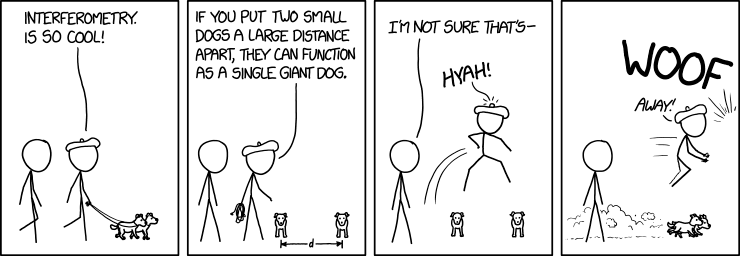Radio Interferometry SS 2019 (astro8404)
Prof. Dr. Frank Bertoldi, Dr. Stefanie Mühle, Dr. Benjamin Magnelli, Dr. Alvaro Sánchez-Monge
(https://xkcd.com/1922/)
Join the gold rush in the Golden Age of Astronomy!
Now in its seventh year of operations, ALMA produces on average about 700 GB/night of high-quality astronomical data. While the investigative teams of successful ALMA projects are kept busy with the primary goals of their proposals, the ALMA archive turns into a goldmine for those knowledgeable in the art and craft of radio interferometry: Bring out compact sources or reveal extended emission just by tweaking the weighting scheme! Explore the outer parts of the spectral windows and discover the traces of unaccounted molecular species! Learn to distinguish imaging artifacts from real mind-boggling features! Build comprehensive multi-frequency and/or multi-transition studies by combining various data sets of the same source!

The Master-level course "Radio Interferometry: Methods and Science" offers hands-on training in the data reduction and analysis of interferometric data for Master students, PhD students and senior astronomers.
The course starts with a brief review of the basic concepts of radio interferometry including calibration and imaging. Then the various steps necessary to create fully calibrated data cubes from interferometric raw data are discussed. Already during the lectures, the participants can practice the individual steps on their copy of an ALMA data set, using two powerful compute servers and the versatile Common Astronomy Software Applications (CASA) package. In the final sessions, the participants learn how to analyze their interferometric data and what additional considerations are required for special research topics like polarization studies.
Participating:
If you are a Master student at the university of Bonn or Cologne, you can take this course for credit, obtaining 4 CP. Following the hands-on approach of the course, the coursework relevant for the final grade consists of assignments related to the data reduction and analysis of a small interferometric dataset, followed by a presentation (Referat, 15 min length) and a short paper summarizing the data reduction and the analysis (5-12 A4 pages). It is expected that "for credit" students attend all the lectures/tutorials and register for the exam on Basis before the deadline.
You are also very welcome to attend if you do NOT want to/need to earn credit points!
Remote participants:
We will offer remote access to the course on a best-efforts basis using the videoconferencing system zoom, which the participants can join without charge and on a variety of platforms. If you would like to follow the course from a remote location, please contact us by Friday, 29 March 2019 at "arc at astro.uni-bonn.de".
Logistics:
The lectures start on 03 April 2019. During the first lecture on 03 April 2019, we will collect the email addresses of all participants. We will use that list to create the computer accounts needed for the hands-on parts of the course. We will also use it to circulate updates, material and other information related to the course. If you can't attend on 03 April, but are interested in participating in the course, please contact us before Friday, 05 April 2019.
Time & date: |
Wednesdays, 03 April 2018 - 10 July 2018, 10:15-12:45 CEST (08:15-10:45 UT) |
Location: |
CIP-Pool (AIfA, room 0.007) or via zoom |
Organization: |
Stefanie Mühle, muehle at astro.uni-bonn.de, AIfA R. 1.002 |